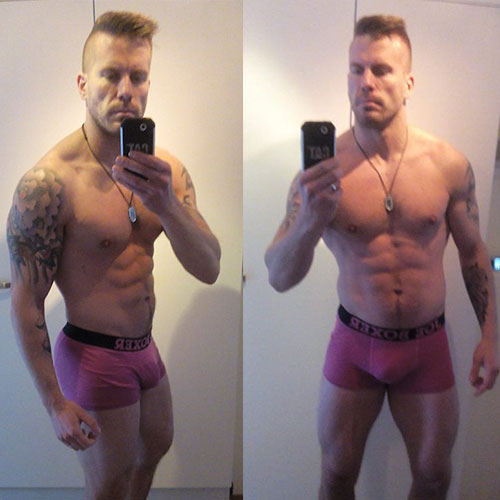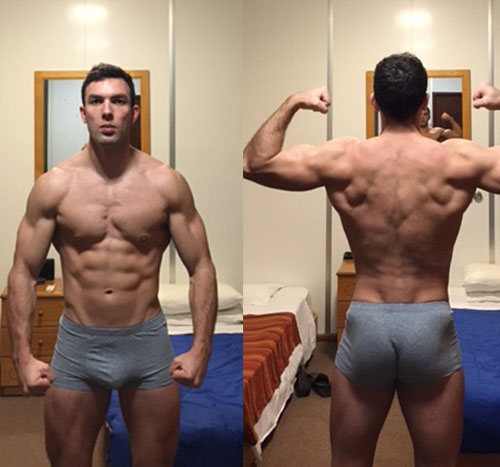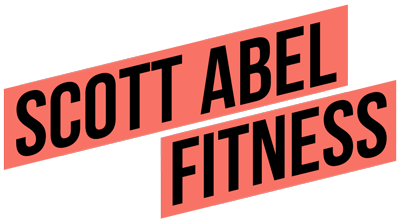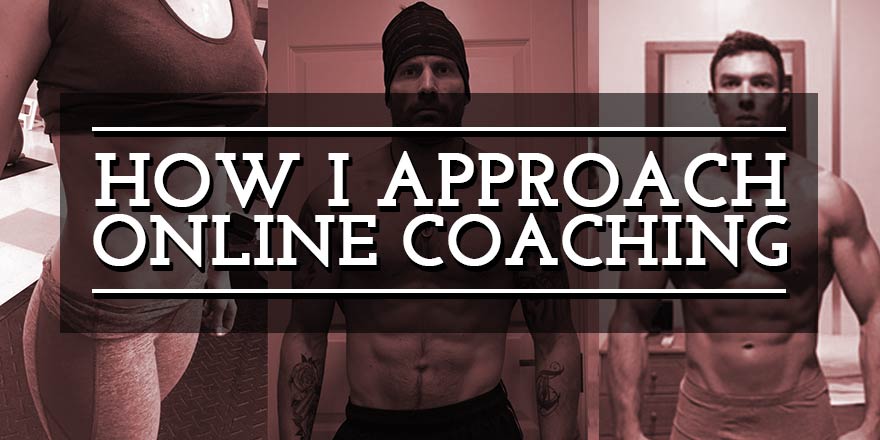I’m writing this giant post to address some of the most frequent questions/misconceptions I get about my coaching services, and to give people a better idea of how I approach what I call “Big-C” Coaching.
This should be valuable for people looking to hire a Coach, for people who want to be a Coach, and of course for people who are curious about how I approach these things.
This blog has three parts:
PART ONE. 3 client examples to show “what’s possible” with Coaching
PART TWO. The 4 most common questions I personally get about Coaching
PART THREE. What I Believe Are the 10 Principles of Successful Online Coaching
PART ONE.
3 Client Examples to Show “What’s Possible” With Coaching
Ludmila S.
Ludmila sent me these pictures over the weekend. This is what she maintains, without yo-yoing or feeling exhausted.

Pekka R
This is Pekka. I wish I had before photos, but he has dropped 40 lbs. since Christmas. He lives in Finland, where he is a police officer.

N T
N T is in the military and is currently deployed, flying missions. (I'm actually using different initials for him, per his request, for security reasons.) I believe right now he’s on a weekly cheat meal as we approach supercomp. He has also been on my Hardgainer Solution for almost as long as I have – multiple YEARS.

I want to emphasize that these people are from all across the world: the other side of Canada, in Finland, and deployed in the military. They all have very stressful jobs with irregular hours. They’ve all been with me a year or longer. The coaching is done 100% online.
When I talk about clients like this, everyone always wants to know what diet or training program a client is following, but that’s not the common thread. The common thread is the Coaching, and that's all about the application of their diet and training at the right times, the balance between their goals, their jobs, their needs, bodies and genetics, and not to mention the focus on mindset and the process. They’re all on different diets and different programs – and even were you to look at a single client, most of my clients will switch training programs every 8 to 20 weeks on average as they progress and we work on different things (depending on biofeedback, etc). But even then, look at N T’s case: the expertise and nuance sometimes comes in not changing a program.
There are more photos in my clients section. Some of them have before and afters, if that’s what you want to see. You can also see what’s possible in some of the free preview videos available in my Cycle Diet course. (Scroll down to Section 2, with the case studies. With the exception of Annie, these are all clients, just ones who happen to have used the Cycle Diet—but even then, it was all individualized.)
I often write about mindfulness, embracing the process, etc and I have found that some readers take this to mean that you have to completely give up on your physique goals, and abandon a diet strategy altogether, and that's what Coaching entails. This is NOT true. It means that you focus on the process first, so that those other things fall into place. You also approach your goals from a better space mentally, so that you’re actually able to achieve those goals (“mindset determines behaviour”). Yes, sometimes that means you develop new, better goals, but no, not always.
These are the kinds of things I will often work on with clients, so that the process becomes easier for them (no “struggle”), even as they know that they’re getting the best possible diet and training programs for their goals. THAT is the common thread. It’s that balance. Yes, expert, individualized programming for diet and training, that is a factor, but also emphasis on the process to get there.
PART TWO.
The 4 Most Common Questions I Get from Potential Clients (and my answers)
“I currently do _______. Will your program work for me?”
It should be clear from the above that I don't have ‘a’ program, and no good Coach is going to give every client the same program. Good coaches fit the program to the client, not the other way around. I base a client’s diet and training on their needs. This depends on what they've been doing, their body, their goals, everything. Coaches coach PEOPLE.
Yes, there are some common threads to what I send my clients. I think low-carb diets are terrible for most people (even then: not all, but most). I see a lot of value in bodypart training. Most of my clients at some point will do some form of MET training, or a hybrid approach to MET, but again: it's all dependent on their needs/goals etc.
“Do you Coach regular people, or only bodybuilders?”
Yes, I Coach regular people, and am always, always open to that. Some of my most enjoyable big-C Coaching is helping people conquer real-world obstacles: balancing career, fitness, family, stress, etc.
I don’t take on clients based on their genetics or what they can do for my reputation. (This is wrong. It tends to run more rampant on the competitive side of the industry.) I take on all clients who are open to real Coaching.
“Do you still Coach bodybuilders, fitness models, and physique athletes who want to compete?”
The people who ask if I coach regular people would be surprised to learn that I get the exact same question from physique athletes, except they’re wondering if I will still coach THEM. The answer is still YES.
I can help you put on muscle, diet down to get ready for a show or a photoshoot, etc., all that sort of thing – however this comes with two caveats: 1) Steroids are out, and I won't help you with that, and 2) I will be honest if I think competing is not in your best interests, and especially if I think that – given your body and genetics – it will do real damage to you.
An operating mantra of a big-C Coach should be a version of the Hippocratic oath: “First, Do No Harm.” I won’t do harm to clients long-term just to help them win a show, even though with how messed up the industry is and the whole “anything to win” mindset, it would be far more lucrative to do so.
“I wish you were closer! Do you Coach people in [insert location]? ”
Yes. I’m an online Coach, so I Coach people from all over the world. It is 2016 and any physique Coach can do this if they know what they're doing.
One of the things I tell people who ask me this is, “Don’t pay for proximity, pay for expertise.” Find the best possible Coach you can, not just the best one who happens to hang out at your local gym! All the clients above were Coached online.
Listen, a good Coach can work with ANYONE who’s willing and open to actual Coaching. That is the only caveat, though it is an important one, to be sure, even if it “sounds” obvious.
Sometimes people will email me their assessments, and instead of offering honest truth about their lives and their goals, it’s just a list of what they think they “need” and “demand” from me. (E.g. “I need to drop 20 lbs. of fat and gain 10 lbs. of muscle in 5 weeks… oh and I bought X, Y, Z supplements so my diet needs to include those.” ) I just can’t Coach that, and I will say so: “Sorry, here’s your money back – we’re not a good fit.”
I’ve said this on Facebook before, and on many previous blogs, but my most successful clients are the ones who trust the process and who are open to change; and even though they sometimes get results very quickly, they also tend to be the ones who stay with me for more than just a few months, because they understand there’s more to Coaching and success than sending someone a diet and workout program.
No one ever wants to hear stuff like this, because they just want the magic bullet or the 6-week fix. But it's the truth. This is why a long time ago I adjusted my coaching prices to have a larger fee up front, but then my ongoing fee is much less than many other trainers out there. This dissuades most of those who really only want a quick fix and attracts those who truly see it as an “investment.”
PART THREE.
What I Believe Are the 10 Principles of Successful Online Coaching
If you're reading this because you want to be a Coach, you can read more about this whole topic in my book on online Coaching.
However, for now, let me outline the main principles I believe that every successful online coach uses in their coaching, even if they don’t know it. These principles are what separate big-C Coaches from “trainers.” Think of it like a professional sports team. I have used this analogy before. Who has more responsibility, the Coach, or the trainer? The Coach is the one who sees the whole picture, and considers the whole context; “training” sometimes falls under this umbrella, but the Coach's job is about much more than that.
If you were a football athlete, which one would you want to work with, especially on a long-term basis: the team Coach, or the team trainer? The trainer will help you train for the 40-yard sprint, but the Coach will help you with that and much more. They will help you see the game in a whole new way. They might help your off-season training, but they’ll also help you with mindset, with managing your energy, with understanding the art and nuances of the playbook you’re using. The Coach is operating on a different level entirely. The Coach is not just about the training – the Coach is managing people and the dynamics of an entire team, the potential of each player, and then integrating all that with a deep knowledge and love of the game.
To be on that level, and to be a true Coach in the fitness or physique industry, means abiding by these principles:
1) Coaching is a relationship, and this means it is based and built on trust.
This isn’t just a cliché. It’s a basic necessity for the relationship to work. Clients need to feel safe and secure in sharing themselves with you. If they don’t feel secure, they won’t share with you, and you won’t get information you need to properly do your job.
Clients need to be secure in the notion that they will not be ridiculed, demeaned, humiliated, or punished for their openness and honesty about any struggles they may bring to you. They may have even experienced these things with past trainers, and you need to be sensitive to that.
2) Your client’s dignity is as important as yours, if not more important.
Which clients you take on should not be about financial gain, but about being a good fit. This is why it matters less to me whether someone is a bodybuilder or just trying to lose weight, or trying to find some balance between their career, their family, and their fitness. Different clients have different obstacles. Sometimes the client with lousy genetics who has lost 20 lbs. has overcome much more than the genetically gifted IFBB pro. Having the IFBB pro on your client list will result in more referrals at first, but in the longer term, being the Coach who can work with REAL INDIVIDUALS (as opposed to dropping people who don’t have great genetics) is what will build a sustainable career.
A corollary to this is that once you accept an individual client’s money, you also accept that client as a person, and the client should feel accepted. A client will feel accepted when they are listened to, and when they are treated with patience, kindness and courtesy. They should be invited and encouraged to express their own thoughts and feelings (which represent the mental and emotional realms of awareness). This is the only way to deal with clients as individuals, and not as recipients of “your” programs and diets to follow. It’s not about “your” program. It’s about your client, as an individual.
Whatever their goals, whatever their challenges, your clients’ dignity should be protected by you, as their “Big C” Coach. If you slip on any of the above, then you’re not being a big-C Coach; you’re being a personal trainer, at best.
3) Your client should feel recognized by you.
Every client deserves and needs your recognition. Clients need to be acknowledged, and they need to know and feel that your interaction with them is not a burden on you. (And it shouldn’t be—being their Coach is a privilege.) It’s why they pay you.
This is especially true in an online relationship that is built on trust. Whether the client is 50 lbs. overweight, or whether the client looks like the Grecian ideal, the same rules apply. If you can’t give clients equal recognition, then you shouldn’t take them on as clients.
I get letters from many people who complain that come contest season, their own so-called coach has abandoned them in favor of competitors with a better chance of winning, or because the coach is competing, so they’ve become short-tempered, impatient, or hard to get hold of. If this is you, then you should NOT be an online Coach!!
4) Online coaching demands support, not condemnation.
Clients need to receive constructive feedback. They need to get feedback in non-demeaning ways that focus on positives, and less on negatives. As a Coach you need to recognize the areas in the triangle of awareness (mental, emotional, physical/behavioral) where you can build on a client’s strengths, and not always focus on their weaknesses.
5) Patience is a virtue, but it is also a necessity.
If you are impatient with a client, it’s a sign the client is challenging you in some way you are not used to. That’s on you, not on the client. Most clients who challenge your patience are not questioning what you know; they are trying to understand what they don’t know.
6) Teach clients how to fish.
Only desperate frauds present themselves as the gatekeepers to the world’s fish supply. It is a Coach’s responsibility to teach the client they can rely on themselves to make decisions. Even their bad decisions can be useful teaching points in the relationship.
[Tweet theme=”basic-white”]Frauds present themselves as gatekeepers to the world’s fish supply. Coaches teach clients how to fish http://bit.ly/cchngblg[/Tweet]
The Coaching relationship is not about maintaining “power.” In a sense, it is about “authority”—but this is the authority forged only through trust. Your job, ultimately, is to make your job obsolete for that client. In real-world terms, that can take awhile, so although it is counter-intuitive, when you enter the relationship with that mindset, and your clients trust you and know this is happening, you end up keeping clients for longer.
7) The program fits the client, not the other way around.
Within that approach the big-C Coach makes the program fit the client, and doesn’t try to make a client fit the program. A client must be assigned protocol that their level of work and intelligence can handle. This is true whether it’s the “latest thing” or not. This includes assessment of lifestyle stressors, athletic background, physique goals, career goals, family considerations—the whole picture.
[Tweet theme=”basic-white”]The workout plan fits the client, and doesn’t try to make a client fit the workout plan! http://bit.ly/cchngblg[/Tweet]
8) Provide incentive with positive feedback.
Save any kind of negative feedback only for when it is absolutely necessary. Be understanding in a supportive and encouraging way. A client has to be able to come to you with issues and problems and roadblocks, so you must create a communication atmosphere that allows them to be comfortable doing so. This doesn’t mean you cheerlead everything a client does or says. No adult needs or wants that. It means you keep it real, but with the diplomacy of encouragement.
9) Your underlying philosophy and approach as a Coach must be consistent through each interaction.
A client’s interaction with you should take place in a communication environment that your client can rely on. You can’t be hot then cold, up then down, engaged then withdrawn. Your approach must be consistent in order for your approach to work. If a client can’t rely on you to be consistent, then they can’t rely on you.
10) You raise a client up by being a consistent and reliable force in their lives.
Coaching is not about what you know; it’s about what a client needs from you. Read that again, until it sinks in. It's not about you, or what you know. It is about the client. What a client needs varies from one client to the next. Figure out what each client needs most. It may not always be what you assume it is. If you are a Big-C Coach, you will realize you are actually in the people business, not the fitness business.
The clients of good coaches feel their esteem raised by their participation in the relationship. This retains clients over the long-term. If you make it all about sets, reps, exercises, and diets, clients will move on, and you will experience a rapid turnover of clientele. This is not good for your own future job security.
It’s less about seeking followers, and more about creating empowered clients. Friedrich Nietzsche put it this way: “I seek companions who will follow me because at heart, they want to learn to follow themselves.”
It’s not the ROLE of the Coach that matters; it’s the IMPACT.
>> For more info on Coaching, click here.

